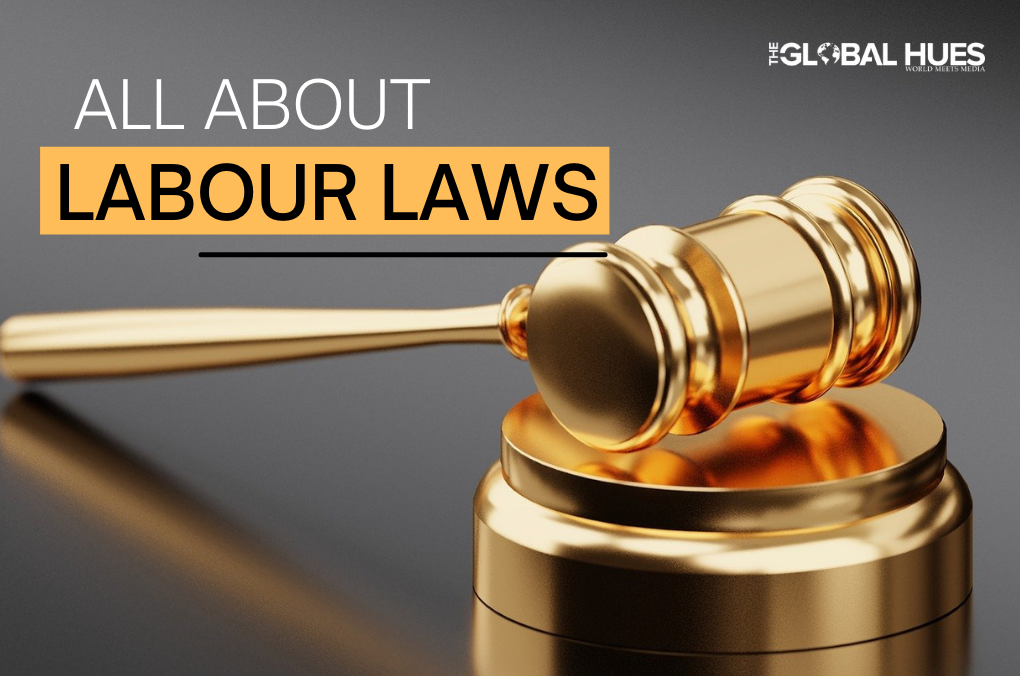What is labor law?
Labor laws are enacted by the government of a nation to provide economic and social justice to the workers in industries. They also specify the responsibilities of the worker in industries.
Laws vary among different regimes.
It is a provision for the fair distribution of profits and benefits emerging from the industry between industrialists and workers. Also, protecting the workers against harmful effects on their health safety, and morality.

Why do we need labor laws?
Labor laws are important in any country due to the following reasons:
- It improves industrial relations(the relationship between employer and employee)
- Minimizes industrial disputes.
- It reduces conflicts and strikes among workers.
- Compensation to workers: any worker traveling for work or getting hurt during the work is paid compensation.
The need for the cooperating relation labor and management.
- The mutual participation of employees and employers in decision-making will improve the working life as the decision can be taken in favor of both parties.
- The economic growth of an industry is sustained when workers work in harmony.
- An efficient industry contributes to improving the national economy to a great extent.
The USA covers terms and conditions of employment, industrial relations, discrimination, maternity and family leave rights, and business sales in 51 jurisdictions.
Primary federal laws
The United States department of labor administers 180 federal employment laws. The primary federal employment laws prohibit employers from discriminating against employees based on color, religion, race, sex, pregnancy, national origin, disability, age, or genetic formation.
Also, there are other state and local laws present to protect against employment discrimination.

PC: bureau of labor statistics

Minimum terms and conditions
The Fair label standard act defines requirements of hours and wages. Under this act, employers are required to pay employees the federal minimum wage for up to 40 hours per week and overtime pay for hours exceeding this time.

Right to refuse
A safe working environment is the legal right of employees. They are legally entitled to work areas free of hazardous substances and dangerous materials and any faulty equipment that could cause an injury. An employee has the right to refuse in such a working environment until the situation is rectified.
Family And Medical Leave Act
Under FMLA, an employee is permitted to take medical or family leave up to 12 weeks if he/she has been with the organization for 12 months.
Pregnancy Discrimination Act
The Pregnancy Discrimination Act (PDA)prohibits discrimination based on pregnancy regarding any aspect of employment, including hiring, firing, payment, promotions, job assignments, layoff, training, benefits such as leave and health insurance, and any other term or condition of employment.
Pregnancy discrimination involves treating a woman whether a candidate or an employee unfavorably because of a medical condition related to pregnancy or childbirth.
The employer has to reinstate the employee to the same position held prior to leave.
Is there paternity leave too?
FMLA is a gender-neutral law. It gives the father the same rights as mothers and allows them to take paternity leave.

PC: Insperity
The age discrimination employment act of 1967
- This act protects the rights of 40 years and older from workplace discrimination.
- Companies with 20 or more workers are entitled to this act.
- This Act is meant to diminish the suffering of long-term unemployment on older workers.

PC: WHN solicitors
- The Angle Of Dissimilarity: Unique Perspectives
- Corporate Social Responsibility: Endeavour To Make Society A Better Place
Child labor laws
Children under 14 years
They cannot be allowed to work in non-agricultural jobs. However, there are other sectors where they can work. These sectors include Actors or performers, newspaper sales and babysit on casual to earn pocket money.
They can work in a business owned by their parents. But the job should not be hazardous

PC: The balance every day

PC: best resume
14-15-year-olds
They’re allowed to work at certain places. These include retail jobs, tutoring, and delivery jobs. The timings for the work should be between 7 am to 7 pm (during the school year).
7 am to 9 pm (in summer)
16-17-year-olds
They are allowed to work for unlimited hours. However, the employment site should not be hazardous. Some of the prohibited occupations are mining, excavation, and forest firefighting.
18 year old
The youth reached this age are no longer bounded to federal youth employment and child labor laws. He or she is permitted to work at any legal job.
Business sale
When a business is sold, the successor owner has no duty to retain former employees.
Additionally, the successive owner may set new terms and conditions of the employment if the employee is retained. The employee must accept those conditions prior to continuing employment.
The employee does not have the right to information unless the employer is covered under WARN(Workers Adjustment and Retraining Notification Act). The employer needs to give at least 60 days’ notice to employees in case of any employment termination.
The WARN applies to the organization having more than 100 or more employers. Furthermore, if an employer violates the WARN provision, they are liable to back pay and benefits to each displeased employee.
Potential claims of a dismissed worker
If a worker is dismissed, these are claims that can be brought under the laws violated by the employer.
- Unlawful discrimination
- Wrongful termination
- Breach of express
- Breach of an agreement
- Raging for exercising a legal right.
Solutions to the claims will depend on the governing jurisdiction. This includes:
- Back pay (past salaries and benefits)
- Front pay(compensation)
- Attorney’s fees and costs
- Injunctive relief (cease or starting of a specific action)
Enforcing Restrictive covenants

Laws governing restrictive Covenants (legally binding clauses between two parties) vary from state to state.
When Court assess whether the covenant
- Protects legitimate business interests
- Reasonable in scope
- Reasonable to the time.
- Geographic restrictions
Then enforceability of restrictive covenants is considered adequately.
Data protection rights
There are several federal and state laws that regulate the collection, use and disclosure, and transfer of personal data of current and former as well as independent contractors and non-employees.
Primary federal laws for Data protection in the United States are:
- The Fair Credit Reporting Act: Applies to those who obtain consumer reports.
- The Federal Trade Commission Act: forbids unfair and deceptive practices.
- The Genetic Information and Nondiscrimination Act: Applies to genetic information
- Health Insurance Portability and Accountability Act: Regulates medical and health information.
Pre-employment checks
Employers are not restricted to conduct pre-employment checks (such as criminal record checks) on prospective employees. The employer must respect the federal laws that protect the rights of workers from unlawful discrimination while compiling background information.
Use of social media in the workplace
The National labor relations act gives employees the right to engage in “protected concerted activity” which includes the use of social media discussions.
Some state laws have limited how employers may control the use of social media by an employee.
- Top Six Social Media Marketing Tips For Small Businesses
- Social Media Marketing: Benefits And Importance
- CEOS In The World Of Social Media
- How To Enhance The Reach On Social Media?
- What Are The Problems Faced By Businessmen On Social Media?

PC: new breed marketing
Whistleblower protection act
This law protects the federal government workers from avenge if they disclose any dishonest and illegal activities of the government organization. the non-government employee is similarly protected under other legislation.
Conclusion
Labor laws are necessary to protect the social security of the workers in an industry. In the United States, primary federal laws are protecting the rights of workers in the public and private sectors.
Also Read:
- Most Trusted Legal Consultants In India
- How A Lawyer Can Help You Navigate A Motorcycle Accident Claim
- 5 Laws You Should Know About Premises Liability In Arizona
- Learn When You Can File A Lawsuit For A Bus Accident
- All You Need To Know About Indian & Worldwide Cyber Laws
- An Ultimate Guide To Indian Laws Concerning Waste Management




